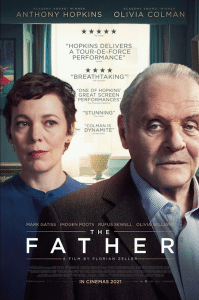The Father | Movie Review

From the beginning of Florian Zeller’s “The Father,” it is apparent things are not what they seem in the life of Anthony (Anthony Hopkins). The elderly man lives in a stylish, modern style apartment that seems to change from scene to scene, even becoming a doctor’s office at one point. The furnishings, the kitchen layout, and contents of a closet are just a few of the things that seem to change with each new scene.
We are introduced to Anthony’s daughter Anne (Olivia Colman), who is seen early on telling her father she is moving away from London. Ann pleads with her father to get along with a new caregiver – something he hasn’t been able to do in the past. He continues to insist he doesn’t need anyone to look after him.
From Anthony’s appearance and ability to converse in a sensible way, viewers begin to think there may be something terribly strange going on. Anthony loses his watch constantly, has conversations with people and memories of conversations that seem to have never happened, and even finds himself confronted by people he doesn’t know who call him “Dad” and wonder why he is looking at them strangely. A son-in-law, Paul, that he doesn’t remember changes identity (from Rufus Sewell to Mark Gatiss and back again), seemingly overnight. Time passes quickly, and Anthony often finds himself baffled that he hasn’t changed out of his pajamas when it is actually time for dinner.
Dinners of chicken, potatoes and broccoli seem to occur over and over as do morning conversations about a new caregiver named Laura (Imogen Poots) who becomes the object of Anthony’s wrath, flirtation and anguished pleas for help. At times, Anthony appears to think he is a younger man. At times, a child. The movie seems to twist and turn through a chronological fog as viewers struggle to understand and keep track of events.
As this struggle continues, and as viewers are pulled more and more into Anthony’s anxious and frenzied existence, we become aware of Anne’s existence also, realizing she is beginning to lose herself in caring for her father. We get glimpses into their pre-dementia relationship, with short snippets of tenderness along with cutting remarks from Anthony about Anne’s favored sister Lucy. Regardless of her love and loyalty for Anthony, Anne fantasizes about a life without him. Coleman gives an honest and heartbreaking performance, allowing us to see cracks in her dutiful exterior when her resilience has been broken down. The scene in which she tries to explain Anthony’s new arrangement to him is real, full of anguish, and exquisitely presented. As she rides away in a cab, she says nothing, but her posture and face tell us that has resigned herself to a new realization; what she has done is for the best.
Hopkins is at his best here, taking on a challenging role at the age of 83 and confirming why he is one of the greatest actors of all time. Again, as with Coleman, Hopkins exudes a plethora of emotions with a withered gaze, a trembling hand, or a hesitating and confused dance around an unfamiliar kitchen. We see cruelty, explosive anger, vulnerability, childlike fear and gut-wrenching frustration in quick succession, yet executed with careful presentation. Masterful performance.
This is not a feel-good movie by any means, but it is beautifully put together and wonderfully acted. Zeller’s script presents the topic of dementia through the eyes of the victim, and we are left with realizations and compassion as the final, tragic scene tells us what we’ve known would happen all along.
My grade: A. I encourage you to go see it, but please know you will most likely be exhausted instead of entertained. Still, you’ll be glad you watched.
“The Father” starring Anthony Hopkins and Olivia Colman opens in theaters today and is rated PG-13 for distress and some language. Running time is 1 hour and 37 minutes.





